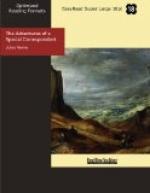“Yes, Gibraltar?” said the major.
“Go under it!” said I. “A tunnel fifteen kilometres long is a mere nothing! There will be no English Parliament to oppose it as there is to oppose that between Dover and Calais! It will all be done some day, all—and that will justify the vein:
“Omnia jam fieri quae posse negabam.”
My sample of Latin erudition was only understood by Major Noltitz, and I heard Caterna say to his wife:
“That is volapuk.”
“There is no doubt,” said Pan Chap, “that the Emperor of China has been well advised in giving his hand to the Russians instead of the English. Instead of building strategic railways in Manchouria, which would never have had the approbation of the czar, the Son of Heaven has preferred to continue the Transcaspian across China and Chinese Turkestan.”
“And he has done wisely,” said the major. “With the English it is only the trade of India that goes to Europe, with the Russians it is that of the whole Asiatic continent.”
I look at Sir Francis Trevellyan. The color heightens on his cheeks, but he makes no movement. I ask if these attacks in a language he understands perfectly will not oblige him to speak out. And yet I should have been very much embarrassed if I had had to bet on or against it.
Major Noltitz then resumed the conversation by pointing out the incontestable advantages of the Transasiatic with regard to the trade between Grand Asia and Europe in the security and rapidity of its communications. The old hatreds will gradually disappear under European influence, and in that respect alone Russia deserves the approbation of every civilized nation. Is there not a justification for those fine words of Skobeleff after the capture of Gheok Tepe, when the conquered feared reprisals from the victors: “In Central Asian politics we know no outcasts?”
“And in that policy,” said the major, “lies our superiority over England.”
“No one can be superior to the English.”
Such was the phrase I expected from Sir Francis Trevellyan—the phrase I understand English gentlemen always use when traveling about the world. But he said nothing. But when I rose to propose a toast to the Emperor of Russia and the Russians, and the Emperor of China and the Chinese, Sir Francis Trevellyan abruptly left the table. Assuredly I was not to have the pleasure of hearing his voice to-day.
I need not say that during all this talk the Baron Weissschnitzerdoerfer was fully occupied in clearing dish after dish, to the extreme amazement of Doctor Tio-King. Here was a German who had never read the precepts of Cornaro, or, if he had read them, transgressed them in the most outrageous fashion.
For the same reason, I suppose, neither Faruskiar nor Ghangir took part in it, for they only exchanged a few words in Chinese.
But I noted rather a strange circumstance which did not escape the major.




